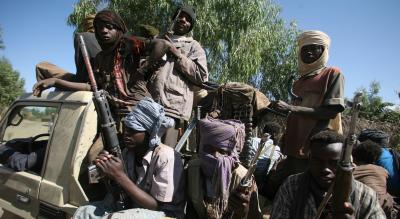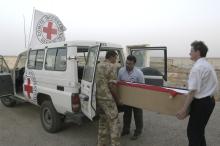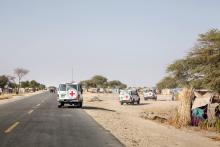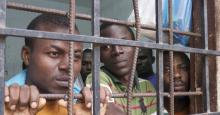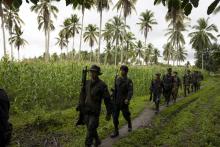Case prepared by Pierpaolo Castiglioni, Constantinidi Yiota, Fiammetta Ferioli, LL.M. students at Roma Tre University under the supervision of Giulio Bartolini (Professor) and Tommaso Natoli (Research assistant), Roma Tre University IHL Legal Clinic; with the contribution of Jemma Arman and Isabelle Gallino, LL.M. students at the Geneva Academy.
A. A CEASEFIRE AGREEMENT INCLUDING PROVISIONS ON THE PROTECTION OF CHILDREN
PREAMBLE
The Government of Sudan (“GoS”) and the Justice and Equality Movement Sudan (“JEM”) (hereinafter referred to individually as the “Party” and collectively, the “parties”) meeting in Doha, Qatar, under the auspices of His Highness Sheikh Hamad bin Khalifa Al-Thani, Emir of the State of Qatar, in the presence of H.E. Ahmad bin Abdallah Al Mahmoud, Deputy Prime Minister and Minister of State for Cabinet Affairs, and H.E. Ms. Aichatou Mindaoudou, African Union-United Nations Joint Chief Mediator ad interim for Darfur, as part of the efforts to find a lasting, just and comprehensive solution to the conflict in Darfur; […]
Condemning all acts of violence against civilians and violations of human rights and international humanitarian law; […]
THE PARTIES HEREBY […]
(4) Agree to immediately cease and refrain from any: […]
j) Recruitment and use of boys and girls under age 18 by armed forces and armed groups in hostilities, in accordance with Sudan’s obligations under the Optional Protocol to the Convention on the Rights of the Child on the involvement of children in armed conflict, and obligations under Protocol II (1977) of the Geneva Conventions of 1949. […]
(5) Further undertake to ensure: […]
c) Full cooperation with UNAMID to implement its mandate […]
h) That all children, boys and girls, recruited by armed forces or armed groups, if any, are released unconditionally through the development of Action Plans.
i) That all children, boys and girls, who are accused of crimes against international law after being unlawfully recruited by armed forced or armed groups are considered primarily as victims of violations against international law and not as alleged perpetrators. […]
B. SUDAN SIGNS AN ACTION PLAN WITH THE UNITED NATIONS
Khartoum, Sudan– In an important milestone for the protection of children in Sudan, the Government signed an Action Plan with the United Nations to prevent the recruitment and use of children by Sudan Government Security Forces. The United Nations welcomes the Government’s commitment to protect children from violations in armed conflict.
“We will work to promote and protect children’s rights in areas of armed conflict and displacement. We are also committed to strengthen existing mechanisms that are included in the Child Act of 2010 and the Sudan Armed Forces law,” said His Excellency Ibrahim Adm Ibrahim, State Minister of Social Welfare.
The State Minister of Social Welfare signed the Action Plan on behalf of the Sudanese Government in a high-level ceremony presided by the Ministry of Foreign Affairs and attended by cabinet ministers to highlight the Government’s determination to turn the page on the recruitment and use of children.
“The United Nations in Sudan stands ready to support every step of the implementation of this Action Plan,” declared the three co-chairs of the United Nations Country Task Force on Monitoring and Reporting, Bintou Keita, Deputy Joint Special Representative for the African Union – United Nations Mission in Darfur, Marta Ruedas, Resident and Humanitarian Coordinator and Geert Cappelaere, UNICEF Representative.
The Action Plan sets out a series of measures to enhance the overall protection of children affected by armed conflict, including the cessation and prevention of child recruitment, and the release of children from national security forces.
The Government also committed to appoint a high-level focal point to coordinate the implementation of this Action Plan and to collaborate with the United Nations in monitoring the implementation of the Action Plan.
A new milestone for the campaign ‘Children, Not Soldiers’
With today’s signing of the Action Plan, all seven countries whose national security forces are listed by the Secretary-General for recruitment and use of children have committed to the objective of ‘Children, not Soldiers’, a global campaign to end and prevent the recruitment and use of children by Government security forces in conflict.
“Twenty years after my mandate was created, governments around the world now agree that children should not be associated with national security forces in conflict,” said Leila Zerrougui, Special Representative of the UN Secretary-General for Children and Armed Conflict. “The Action Plan signed today will bring about a more protected future for the country’s children. I look forward to its full implementation and reiterate my full support to the Sudanese authorities to reach this objective.”
Upon successful completion of all measures agreed to in the Action Plan by the Sudanese Government and verification by the United Nations, the Sudanese Government Security Forces will be removed from the annexes of the Secretary-General’s annual report on children and armed conflict.
C. SUDAN RELEASES 21 CHILDREN
The United Nations welcomes the release yesterday by the Government of Sudan of twenty one children allegedly associated with armed groups. These children, who have been in the custody of the government security forces, were captured during fighting between the Government of Sudan and the Justice and Equality Movement in Darfur, in 2015.
“It is with great joy that we receive the announcement of the release of these children. This action is a clear result of the Government’s determination towards the protection of children who are affected by conflict in the country. The United Nations would like to take this opportunity to reiterate its full support to the Government in promoting and protecting children’s rights in Sudan, including in areas of armed conflict”, says Ms. Marta Ruedas, the UN Resident Coordinator [sic]
The UN regards the release of this group as an important milestone towards the implementation of the Action Plan signed between the United Nations and the Government of Sudan on 27 March 2016. The document aims to contribute to the overall protection of children affected by armed conflict in Sudan and specifically to the protection against and prevention of their recruitment and use, as well as to the release, reintegration and rehabilitation of children.
“Sudanese children cannot continue to be robbed of their future. No child should take part in hostilities. Children should be in school and with their families. I welcome the release of these children as a significant gesture and once again appeal to all the parties associated with armed conflict to stop the recruitment of child soldiers,” says Joint Special Representative Martin Uhomoibhi, Head of UNAMID.
The children will be housed in a government transit centre where they will receive psychosocial and other support that would enable successful reintegration into their families and communities. The UN is working closely with the government’s National Council for Child Welfare to assist this process.
“Today is truly a remarkable day! This release is a reflection of our collective commitment to the Action Plan for the protection of all children in conflict. Their reunification with their families and their reintegration into society will be a major milestone in the realization and preservation of children’s rights and childhood. We will exert all efforts to support the government and its relevant institutions to reintegrate these children”, says Abdullah Fadil, UNICEF Sudan Country Representative.
The successful reintegration of children formerly associated with armed forces and groups into their communities remains a very important goal for the United Nations and other partners in Sudan.
Discussion
I. Classification of the Situation and Applicable Law
1. How would you classify the situation between the JEM and the Government of Sudan? What additional information would you require in order to make such a determination? Under which conditions would Additional Protocol II be applicable? (
GC I-IV, Art. 3;
P II, Art. 1)
II. The Protection of Children in Armed Conflicts
2. What protections are children afforded in non-international armed conflicts? Are they different from the rules applicable in international armed conflicts? (
P II, Art. 4(3) and
6(4);
CIHL, Rules 135-
137)
3. Do children who are detained, such as those freed in Document C, have a special status? If not, do they nevertheless benefit from specific protection? Which one? (
P II, Art. 4(3))
III. Elements Contributing to Respect for IHL
5. What is the advantage of including the prohibition of the recruitment of children in a ceasefire agreement? In your opinion, can a ceasefire agreement potentially increase respect for IHL?
6. (Document B) What do you think of the mechanism set up by the United Nations to add or remove a country from the annexes of the Secretary-General’s annual report on children and armed conflict? Would this practice encourage States to comply with their obligations? Why? Why not? What about the ‘Children, not Soldiers’ campaign? To whom is it addressed? Do you think it is an efficient way to strengthen respect for IHL? Why?
7. What are the benefits of signing the Action Plan during a high-level public event? Does this increase visibility? Does it create further expectations? In your opinion, how did the international community perceive the Action Plan by Sudan? What about the Sudanese population? Why?
8. What benefits do you see in the involvement of the United Nations in the fight against child recruitment?

